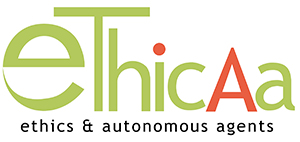Workshop on Ethics in the Design of Intelligent Agents (EDIA16)
As intelligent agents gain increased autonomy in their functioning, human supervision by operators or users decreases. As the scope of the agents’ activities broadens, it is imperative to ensure that such socio-technical systems will not make irrelevant, counter-productive, or even dangerous decisions. Even if regulation and control mechanisms are designed to ensure sound and consistent behaviors at the agent, multi-agent, and human-agent level, ethical issues are likely to remain quite complex, implicating a wide variety of human values, moral questions, and ethical principles. The issue is all the more important as intelligent agents encounter new situations, evolve in open environments, interact with other agents based on different design principles, act on behalf of human beings and share common resources. To address these concerns, design approaches should envision and account for important human values, such as safety, privacy, accountability and sustainability, and designers will have to make value trade-offs and plan for moral conflicts. For instance, we may want to design self-driving cars to exhibit human-like driving behaviors, rather than precisely following road rules, so that their actions are more predictable for other road users. This may require balancing deontic rule-following, utility maximization, and risk assessment in the agent's logic to achieve the ultimate goal of road safety.
Questions to be asked here are: How should we encode moral behavior into intelligent agents? Which ethical systems should we use to design intelligent, decision-making machines? Should end-users have ultimate control over the moral character of their devices? Should an intelligent agent be permitted to take over control from a human operator? If so, under what circumstances? Should an intelligent agent trust or cooperate with another agent embedded with other ethical principles or moral values? To what extent should society hold AI researchers and designers responsible for their creations and choices?
This workshop focuses on two questions: (1) what kind of formal organizations, norms, policy models, and logical frameworks can be proposed to deal with the control of agents' autonomous behaviors in a moral way?; and (2) what does it mean to be responsible designers of intelligent agents?
The workshop welcomes contributions from researchers in Artificial Intelligence, Multi-Agent Systems, Machine Learning, Case-based reasoning, Value-based argumentations, AI and Law, Ontologies, Human Computer Interaction, Ethics, Philosophy, and related fields.
The topics of interest include (but are not limited to):
- machine ethics, roboethics, machines and human dignity
- reasoning mechanisms, legal reasoning, ethical engine
- authority sharing, responsibility, delegating decision making to machines
- organizations, institutions, normative systems
- computational justice, social models
- trust and reputation models
- mutual intelligibility, explanations, accountability
- consistency, conflicts management, validation
- philosophy, sociology, law
- applications, use cases
- societal concerns, responsible innovation, privacy Issues
- individual ethics, collective ethics, ethics of personalization
- value sensitive design, human values, value theory

